Fleurs du Mal Magazine


Or see the index
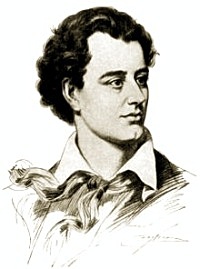
By the Rivers of Babylon
We Sat Down and Wept
1
We sat down and wept by the waters
Of Babel, and thought of the day
When our foe, in the hue of his slaughters,
Made Salem’s high places his prey;
And ye, oh her desolate daughters!
Were scattered all weeping away.
2
While sadly we gazed on the river
Which rolled on in freedom below,
They demanded the song; but, oh never
That triumph the stranger shall know!
May this right hand be withered for ever,
Ere it string our high harp for the foe!
3
On the willow that harp is suspended,
Oh Salem! its sound should be free;
And the hour when thy glories were
ended
But left me that token of thee:
And ne’er shall its soft tones be blended
With the voice of the spoiler by me!
George Gordon Byron
(1788 – 1824)
By the Rivers of Babylon We Sat Down and Wept
(Poem)
• fleursdumal.nl magazine
More in: Archive A-B, Archive A-B, Byron, Lord
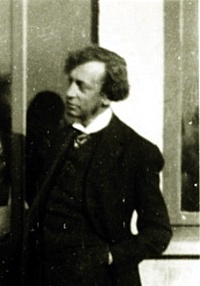
Stad
Verloren tijd, hoe schoon vind ik u weer,
waar elk herinnren wordt een nieuw verlangen.
o Steden-laan, wat zijn uw meisjes schoon.
Eens was ik jong, en ‘k ben niet jong gebleven…
Ik wandel bij de bomen die mijn jeugd
beveiligd hebben en haar jonge liefde.
Water is de adem van een meisjes mond
De stad is heet en droog als een begeerte.
Er is, tussen de dubble glans der laan,
er is een maan, er is een andre maan.
De een is de maan; de andere is gene maan.
Het paard wringt als een zilvren vis. En de ijlte is rood
maar roder zet de galm des voermans de ijlte uit.
Hitte.
Mijn vriend, gij hebt de geur der grote magazijnen.
Zo zijn er meisjes, schraal en met een witte neus.
Leeg schelpje aan nachtlijke ebbe: ik; maar de stad
in duizend dake’ als duizend diamanten.
Ik scheer de muren; – als een rechthoek ligt
naast mij mijn schaduw als een vals gedicht.
Menigte, uw geur bijt mijne lippen stuk.
o Menigte, gij doet mijne woorden bloeden.
Waarom te wenen in dit stenen woud?
Gij zult regeren als gij weet te lachen.
Jaag naar huis, o hart: gij vindt er
volle schotelen aan leed.
Stad: eind-punt; vierkant; rust en zekerheid.
‘k Zet me op een paal; ik wacht de roep der ijlte.
Karel van de Woestijne
(1878 – 1929)
Stad
• fleursdumal.nl magazine
More in: Archive W-X, Archive W-X, Woestijne, Karel van de
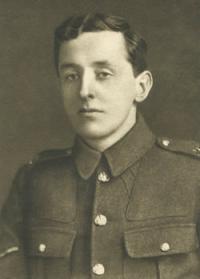
Shelley in the Trenches 2nd May 1916
Impressions are like winds; you feel their cool
Swift kiss upon the brow, yet know not where
They sprang to birth: so like a pool
Rippled by winds from out their forest lair
My soul was stir’d to life; its twilight fled;
There passed across its solitude a dream
That wing’d with supreme ecstasy did seem;
That gave the kiss of life to long-lost dead.
A lark trill’d in the blue: and suddenly
Upon the wings of his immortal ode
My soul rushed singing to the ether sky
And found in visions, dreams, its real abode –
I fled with Shelly, with the lark afar,
Unto the realms where the eternal are.
John William (Will) Streets
(1886 –1916)
Shelley in the Trenches 2nd May 1916
• fleursdumal.nl magazine
More in: - Archive Tombeau de la jeunesse, Archive S-T, Shelley, Percy Byssche, Streets, Will, WAR & PEACE

L’Enfant
Les turcs ont passé là. Tout est ruine et deuil.
Chio, l’île des vins, n’est plus qu’un sombre écueil,
Chio, qu’ombrageaient les charmilles,
Chio, qui dans les flots reflétait ses grands bois,
Ses coteaux, ses palais, et le soir quelquefois
Un chœur dansant de jeunes filles.
Tout est désert. Mais non ; seul près des murs noircis,
Un enfant aux yeux bleus, un enfant grec, assis,
Courbait sa tête humiliée ;
Il avait pour asile, il avait pour appui
Une blanche aubépine, une fleur, comme lui
Dans le grand ravage oubliée.
Ah ! pauvre enfant, pieds nus sur les rocs anguleux !
Hélas ! pour essuyer les pleurs de tes yeux bleus
Comme le ciel et comme l’onde,
Pour que dans leur azur, de larmes orageux,
Passe le vif éclair de la joie et des jeux,
Pour relever ta tête blonde,
Que veux-tu ? Bel enfant, que te faut-il donner
Pour rattacher gaîment et gaîment ramener
En boucles sur ta blanche épaule
Ces cheveux, qui du fer n’ont pas subi l’affront,
Et qui pleurent épars autour de ton beau front,
Comme les feuilles sur le saule ?
Qui pourrait dissiper tes chagrins nébuleux ?
Est-ce d’avoir ce lys, bleu comme tes yeux bleus,
Qui d’Iran borde le puits sombre ?
Ou le fruit du tuba, de cet arbre si grand,
Qu’un cheval au galop met, toujours en courant,
Cent ans à sortir de son ombre ?
Veux-tu, pour me sourire, un bel oiseau des bois,
Qui chante avec un chant plus doux que le hautbois,
Plus éclatant que les cymbales ?
Que veux-tu ? fleur, beau fruit, ou l’oiseau merveilleux ?
– Ami, dit l’enfant grec, dit l’enfant aux yeux bleus,
Je veux de la poudre et des balles.
8-10 juillet 1828
Victor Hugo
(1802-1885)
L’Enfant
(Poème)
Les Orientales
• fleursdumal.nl magazine
More in: Archive G-H, Archive G-H, Hugo, Victor, Victor Hugo
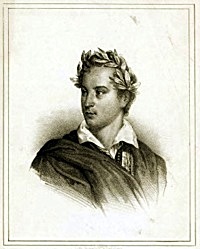
Remind me not, remind me not
Remind me not, remind me not,
Of those beloved, those vanish’d hours,
When all my soul was given to thee;
Hours that may never be forgot,
Till Time unnerves our vital powers,
And thou and I shall cease to be.
Can I forget—canst thou forget,
When playing with thy golden hair,
How quick thy fluttering heart did move?
Oh! by my soul, I see thee yet,
With eyes so languid, breast so fair,
And lips, though silent, breathing love.
When thus reclining on my breast,
Those eyes threw back a glance so sweet,
As half reproach’d yet rais’d desire,
And still we near and nearer prest,
And still our glowing lips would meet,
As if in kisses to expire.
And then those pensive eyes would close,
And bid their lids each other seek,
Veiling the azure orbs below;
While their long lashes’ darken’d gloss
Seem’d stealing o’er thy brilliant cheek,
Like raven’s plumage smooth’d on snow.
I dreamt last night our love return’d,
And, sooth to say, that very dream
Was sweeter in its phantasy,
Than if for other hearts I burn’d,
For eyes that ne’er like thine could beam
In Rapture’s wild reality.
Then tell me not, remind me not,
Of hours which, though for ever gone,
Can still a pleasing dream restore,
Till Thou and I shall be forgot,
And senseless, as the mouldering stone
Which tells that we shall be no more.
George Gordon Byron
(1788 – 1824)
Remind me not, remind me not
(Poem)
• fleursdumal.nl magazine
More in: Archive A-B, Archive A-B, Byron, Lord

Gij draagt een schone vlechte haar…
Gij draagt een schone vlechte haar
allangs uw lage leên…
– Het is een trage dag voorwaar
van weiflen en van wenen.
Het is een lengende avond van
mis-troosten en mis-prijzen.
’t Is of de dag niet sterven kan
en of geen nacht kan grijzen…
– Gij gaat mijn duister huis voorbij,
verlangenloos en rechte;
ik rade uw naakte, magre dij;
ik zie uw donkre vlechte.
Karel van de Woestijne
(1878 – 1929)
Gij draagt een schone vlechte haar…
• fleursdumal.nl magazine
More in: Archive W-X, Archive W-X, Woestijne, Karel van de

Le poëte
Shakspeare songe ; loin du Versaille éclatant,
Des buis taillés, des ifs peignés, où l’on entend
Gémir la tragédie éplorée et prolixe,
Il contemple la foule avec son regard fixe,
Et toute la forêt frissonne devant lui.
Pâle, il marche, au dedans de lui-même ébloui ;
Il va, farouche, fauve, et, comme une crinière,
Secouant sur sa tête un haillon de lumière.
Son crâne transparent est plein d’âmes, de corps,
De rêves, dont on voit la lueur du dehors ;
Le monde tout entier passe à travers son crible ;
Il tient toute la vie en son poignet terrible ;
Il fait sortir de l’homme un sanglot surhumain.
Dans ce génie étrange où l’on perd son chemin,
Comme dans une mer, notre esprit parfois sombre.
Nous sentons, frémissants, dans son théâtre sombre,
Passer sur nous le vent de sa bouche soufflant,
Et ses doigts nous ouvrir et nous fouiller le flanc.
Jamais il ne recule ; il est géant ; il dompte
Richard-Trois, léopard, Caliban, mastodonte ;
L’idéal est le vin que verse ce Bacchus.
Les sujets monstrueux qu’il a pris et vaincus
Râlent autour de lui, splendides ou difformes ;
Il étreint Lear, Brutus, Hamlet, êtres énormes,
Capulet, Montaigu, César, et, tour à tour,
Les stryges dans le bois, le spectre sur la tour ;
Et, même après Eschyle, effarant Melpomène,
Sinistre, ayant aux mains des lambeaux d’âme humaine,
De la chair d’Othello, des restes de Macbeth,
Dans son œuvre, du drame effrayant alphabet,
Il se repose ; ainsi le noir lion des jongles
S’endort dans l’antre immense avec du sang aux ongles.
Paris, avril 1835.
Victor Hugo
(1802-1885)
Le poëte
(Poème)
Les Contemplations
• fleursdumal.nl magazine
More in: Archive G-H, Archive G-H, Hugo, Victor, Victor Hugo

It is the hour
It is the hour when from the boughs
The nightingale’s high note is heard;
It is the hour — when lover’s vows
Seem sweet in every whisper’d word;
And gentle winds and waters near,
Make music to the lonely ear.
Each flower the dews have lightly wet,
And in the sky the stars are met,
And on the wave is deeper blue,
And on the leaf a browner hue,
And in the Heaven that clear obscure
So softly dark, and darkly pure,
That follows the decline of day
As twilight melts beneath the moon away.
George Gordon Byron
(1788 – 1824)
It is the hour
(Poem)
• fleursdumal.nl magazine
More in: Archive A-B, Archive A-B, Byron, Lord

Gelijk een arme, blinde hond
Geljk een arme, blinde hond
van alle troost verstoken,
dwaal ‘k door de zoele avond rond
en ruik de lente-roken.
Er waart – lijk om een vrouwe-kleed
waar oude driften in hangen –
er waart een geur van schamper leed
en van huilend-moe verlangen.
En ‘k dwaal, een blinde hond gelijk,
door dralige lente-roken,
mijn hart van alle liefden rijk,
mijn hart van liefde verstoken.
Karel van de Woestijne
(1878 – 1929)
Gelijk een arme, blinde hond
• fleursdumal.nl magazine
More in: Archive W-X, Archive W-X, Woestijne, Karel van de
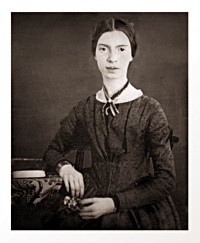
I measure every Grief I meet
I measure every Grief I meet
With narrow, probing, eyes –
I wonder if It weighs like Mine –
Or has an Easier size.
I wonder if They bore it long –
Or did it just begin –
I could not tell the Date of Mine –
It feels so old a pain –
I wonder if it hurts to live –
And if They have to try –
And whether – could They choose between –
It would not be – to die –
I note that Some – gone patient long –
At length, renew their smile –
An imitation of a Light
That has so little Oil –
I wonder if when Years have piled –
Some Thousands – on the Harm –
That hurt them early – such a lapse
Could give them any Balm –
Or would they go on aching still
Through Centuries of Nerve –
Enlightened to a larger Pain –
In Contrast with the Love –
The Grieved – are many – I am told –
There is the various Cause –
Death – is but one – and comes but once –
And only nails the eyes –
There’s Grief of Want – and grief of Cold –
A sort they call “Despair” –
There’s Banishment from native Eyes –
In sight of Native Air –
And though I may not guess the kind –
Correctly – yet to me
A piercing Comfort it affords
In passing Calvary –
To note the fashions – of the Cross –
And how they’re mostly worn –
Still fascinated to presume
That Some – are like my own –
Emily Dickinson
(1830-1886)
I measure every Grief I meet
• fleursdumal.nl magazine
More in: Archive C-D, Dickinson, Emily
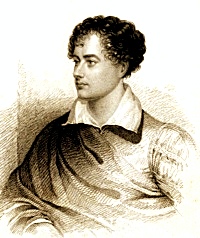
Euthanasia
When Time, or soon or late, shall bring
The dreamless sleep that lulls the dead,
Oblivion! may thy languid wing
Wave gently o’er my dying bed!
No band of friends or heirs be there,
To weep, or wish, the coming blow:
No maiden, with dishevelled hair,
To feel, or feign, decorous woe.
But silent let me sink to earth,
With no officious mourners near:
I would not mar one hour of mirth,
Nor startle friendship with a tear.
Yet Love, if Love in such an hour
Could nobly check its useless sighs,
Might then exert its latest power
In her who lives, and him who dies.
‘Twere sweet, my Psyche! to the last
Thy features still serene to see:
Forgetful of its struggles past,
E’en Pain itself should smile on thee.
But vain the wish?for Beauty still
Will shrink, as shrinks the ebbing breath;
And women’s tears, produced at will,
Deceive in life, unman in death.
Then lonely be my latest hour,
Without regret, without a groan;
For thousands Death hath ceas’d to lower,
And pain been transient or unknown.
`Ay, but to die, and go,’ alas!
Where all have gone, and all must go!
To be the nothing that I was
Ere born to life and living woe!
Count o’er the joys thine hours have seen,
Count o’er thy days from anguish free,
And know, whatever thou hast been,
‘Tis something better not to be.
George Gordon Byron
(1788 – 1824)
Euthanasia
(Poem)
• fleursdumal.nl magazine
More in: Archive A-B, Archive A-B, Byron, Lord
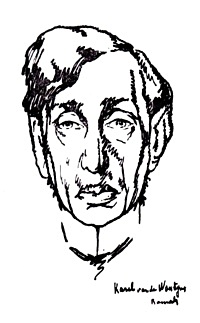
Kind met het bleek gelaat
Kind met het bleek gelaat, dat van uw wijde blikken
geen liefde in mat gebaar noch in lede ogen ziet,
maar in uw zedig kleed uw knieën weet te schikken
zó, dat me te elken male een laaie drift doorschiet:
gij zult het nimmer aan mijn vrome woorden weten
hoe mijn begeren om uw kleren dolen dorst;
maar ìk draag in me-zelf de wonde, zelf gereten,
waarvan de koortse rilt en davert door mijn borst.
Want ‘k heb de straffe zélf in ‘t lillend vlees geslagen;
ik heb een spijt’ge spot gehamerd in mijn brein…
– Gij echter, ga voorbij, arm kind, en zónder vragen:
ik haat u om dees geert’, die ‘k minne om deze pijn…
Karel van de Woestijne
(1878 – 1929)
Kind met het bleek gelaat
Portret: Karel van de Woestijne, Ramah – Journal Het Roode Zeil, 15 April 1920
• fleursdumal.nl magazine
More in: Archive W-X, Archive W-X, Woestijne, Karel van de
Thank you for reading Fleurs du Mal - magazine for art & literature